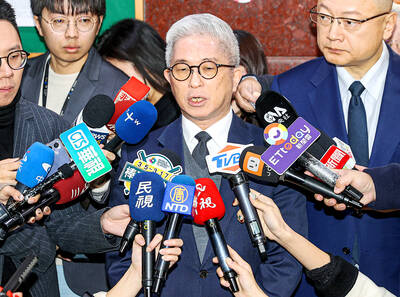The unilateral cancelation by the social networking Web site Facebook of an online petition protesting against the Red Cross Society of the Republic of China’s (ROC) handling of donations for Japanese earthquake victims has sparked accusations of “political manipulation” among Internet users.
“I feel like someone’s keeping an eye on me, I feel afraid and I feel angry at the same time,” netizen Subing (酥餅), who created the online petition with another netizen, Miawko (妙子), on Facebook, wrote on his personal blog.
He was speaking about Facebook’s unilateral disabling of the petition page — which attracted support from more than 30,000 Facebook members within days — on Tuesday.
According to the Red Cross Society of the ROC’s latest figures released on Monday, it has received more than NT$1.8 billion (US$62 million), but so far has only transferred about NT$400 million to the Japanese Red Cross Society.
The organization said it was still awaiting its Japanese counterpart’s plans for the remaining funds.
However, the delay has caused anger among the public and triggered online protests such as the one that Subing and Miawko launched. Many have also asked for a refund of their donations.
In a message to Subing, Facebook said the page was removed because “this Event appears to be an unsolicited commercial communication [spam] and has been deleted via technical measures.” The removal of the page raised suspicions among Internet users.
When Subing and Miawko opened several other petition pages on Facebook with titles bearing the name “Red Cross Society of the ROC” on Tuesday, all were also removed.
“This is too much. Are we under martial law again? Will we all be arrested?” Internet user Pei-fang (佩芳) wrote in a message on Subing’s blog.
Others suspected that cacaFly, Facebook’s advertising representative in Taiwan, had intervened for political reasons.
“I don’t trust Facebook — look who is representing Facebook in Taiwan. They could suppress freedom of speech through technical tricks,” Internet user Spieler said in a message on Subing’s blog.
CacaFly founder and chief executive officer Nathan Chiu (邱繼弘) helped President Ma Ying-jeou (馬英九) manage his Facebook page before becoming Facebook’s advertising representative in Taiwan. Ma and Red Cross Society of the ROC president C.V. Chen (陳長文) also have a close personal relationship.
“I think we should complain to Facebook’s headquarters, because Facebook’s representative in Taiwan could use keyword filtering to remove pages unfriendly to the Red Cross,” netizen pfge said on Miawko’s blog.
Chiu rebutted the accusations by telephone.
“Basically, we’re only Facebook’s advertising representative in Taiwan. We only take care of advertising on Facebook in Taiwan,” Chiu said. “[Facebook’s] operation is handled by Facebook headquarters in the US and has nothing to do with us.”
After several failed attempts, Subing created a “group” page — instead of an “event page” — on Facebook protesting against the Red Cross Society of the ROC late on Tuesday.
The new page remained online at press time.

Conflict with Taiwan could leave China with “massive economic disruption, catastrophic military losses, significant social unrest, and devastating sanctions,” a US think tank said in a report released on Monday. The German Marshall Fund released a report titled If China Attacks Taiwan: The Consequences for China of “Minor Conflict” and “Major War” Scenarios. The report details the “massive” economic, military, social and international costs to China in the event of a minor conflict or major war with Taiwan, estimating that the Chinese People’s Liberation Army (PLA) could sustain losses of more than half of its active-duty ground forces, including 100,000 troops. Understanding Chinese

AGING: As of last month, people aged 65 or older accounted for 20.06 percent of the total population and the number of couples who got married fell by 18,685 from 2024 Taiwan has surpassed South Korea as the country least willing to have children, with an annual crude birthrate of 4.62 per 1,000 people, Ministry of the Interior data showed yesterday. The nation was previously ranked the second-lowest country in terms of total fertility rate, or the average number of children a woman has in her lifetime. However, South Korea’s fertility rate began to recover from 2023, with total fertility rate rising from 0.72 and estimated to reach 0.82 to 0.85 by last year, and the crude birthrate projected at 6.7 per 1,000 people. Japan’s crude birthrate was projected to fall below six,

WARNING: If the defense budget is not approved by the legislature, systems such as the Harpoon missile coastal defense system would be impacted, Hsu Szu-chien said The armed forces have response protocols for a wide range of sudden contingencies, including the “Wan Chun Plan” to protect the head of state, the Ministry of National Defense said yesterday. After US President Donald Trump on Saturday launched a series of airstrikes in Venezuela and kidnapped deposed Venezuelan president Nicolas Maduro, concerns have been raised as to whether China would launch a similar “decapitation strike” on Taiwan. The armed forces regularly coordinate with government agencies and practice drills to ensure preparedness for a wide range of scenarios, Vice Minister of National Defense Hsu Szu-chien (徐斯儉) told reporters before a meeting at

Russia sent a submarine to escort an empty oil tanker that the US military has been pursuing and attempting to seize for weeks, US media reported on Tuesday. The US has been chasing the oil tanker, formerly known as the Bella 1, since it evaded a US blockade around Venezuela and thwarted a US Coast Guard attempt to board it last month. Since being pursued by the US Coast Guard, the vessel has switched its registration to Russia, changed its name to the Marinera and the tanker’s crew reportedly painted a Russian flag on the tanker last month. It had been en route